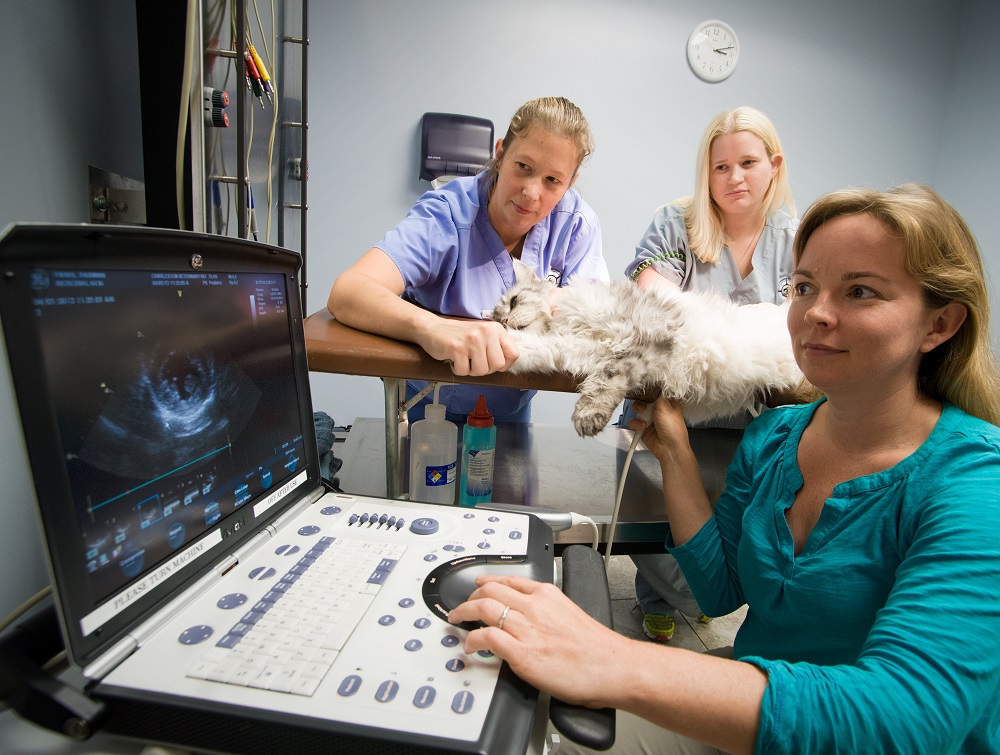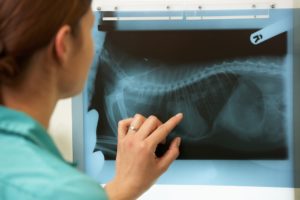Gulf Coast Veterinary Specialists Cardiology Department: Getting to the Heart of the Matter

Chronic valvular disease in pets
Your pet’s heart valves keep her blood flowing in the correct direction through her heart. They close when the heart chambers are filling, and open to allow the heart to pump blood out. As pets age, valves can begin to deteriorate, and may no longer completely close during the filling phase. When this happens, blood flows backward across the valve, which is referred to as regurgitation.
If your family veterinarian suspects chronic valvular disease, we can use a specialized cardiac ultrasound, or echocardiogram, to observe heart valve function and direct treatment. People with valve disease may undergo valve replacement or repair. While mitral valve repair is available for dogs, medical management is more commonly pursued.
Dilated cardiomyopathy (DCM) in pets
DCM results in chamber dilation and decreased contractility, which can eventually lead to congestive heart failure. DCM is observed most commonly in genetically predisposed dog breeds, including (but not limited to):
- Doberman pinschers
- Great Danes
- Boxers
- Cocker spaniels
DCM in dogs and cats has recently been linked to boutique, exotic-ingredient, or grain-free (BEG) pet foods, although the FDA has not yet established a clear cause. Diet-related DCM may be reversible, and pets can potentially regain normal heart function after a diet change.
Hypertrophic cardiomyopathy (HCM) in cats
Cats can develop HCM, which is a type of heart-muscle disease that causes their heart walls to become thickened and stiff. HCM diagnosis is challenging, because the heart may not appear enlarged on X-rays, and echocardiography is needed to evaluate chamber size and measure wall thickness. Affected cats may not show signs until the disease is advanced. Potential complications associated with HCM include congestive heart failure development and arterial thromboembolism, in which a blood clot develops that breaks free and lodges in a blood vessel. In many cases, the clot blocks blood flow to the hind limbs, resulting in pain and inability to use one, or both, legs.
The long-term prognosis for cats with HCM varies, since some cats don’t develop clinical signs for years, while others develop more progressive heart disease. Likewise, some cats diagnosed with HCM do not develop CHF until several years after diagnosis, or may never develop CHF, while others have a form of the disease that progresses more rapidly.

Cardiac arrhythmias in pets
An arrhythmia occurs when a pet’s heart beat does not follow a normal rhythm. Arrhythmias are caused by a disturbance in the heart’s electrical activity that results in an altered heart rate (i.e., the heart rate is too fast, or too slow), or an irregular pattern. Some pets are not affected by arrhythmias, but others have problems, such as weakness, fainting, congestive heart failure, insufficient blood flow to vital organs, and sudden death. Your family veterinarian can diagnose some arrhythmias with an electrocardiogram (ECG), which measures the heart’s electrical activity; however, some arrhythmias occur sporadically, and may not be recorded during a short ECG reading. We can outfit pets with a Holter monitor, which is a 24-hour monitor that evaluates heart rate and rhythm over a longer period of time. The information is analyzed to determine the arrhythmia type, frequency, and severity. After we make a detailed diagnosis, therapy can be started if indicated.Pulmonary hypertension in pets
Pulmonary hypertension is high blood pressure in your pet’s lung vessels that can be caused by a narrowing of the arteries and capillaries, arterial blockage, or an abnormally large blood volume overloading the vessels. High pulmonary blood pressure may develop secondary to an underlying condition, such as heartworm disease, a congenital heart defect, or primary lung disease. Pulmonary hypertension can lead to heart enlargement or congestive heart failure, and can cause these signs:
- Rapid breathing
- Difficulty breathing
- Decreased energy level
- Coughing
- Weight loss
- Distended neck veins
- Enlarged abdomen
- Blue-tinged gums
- Collapse
